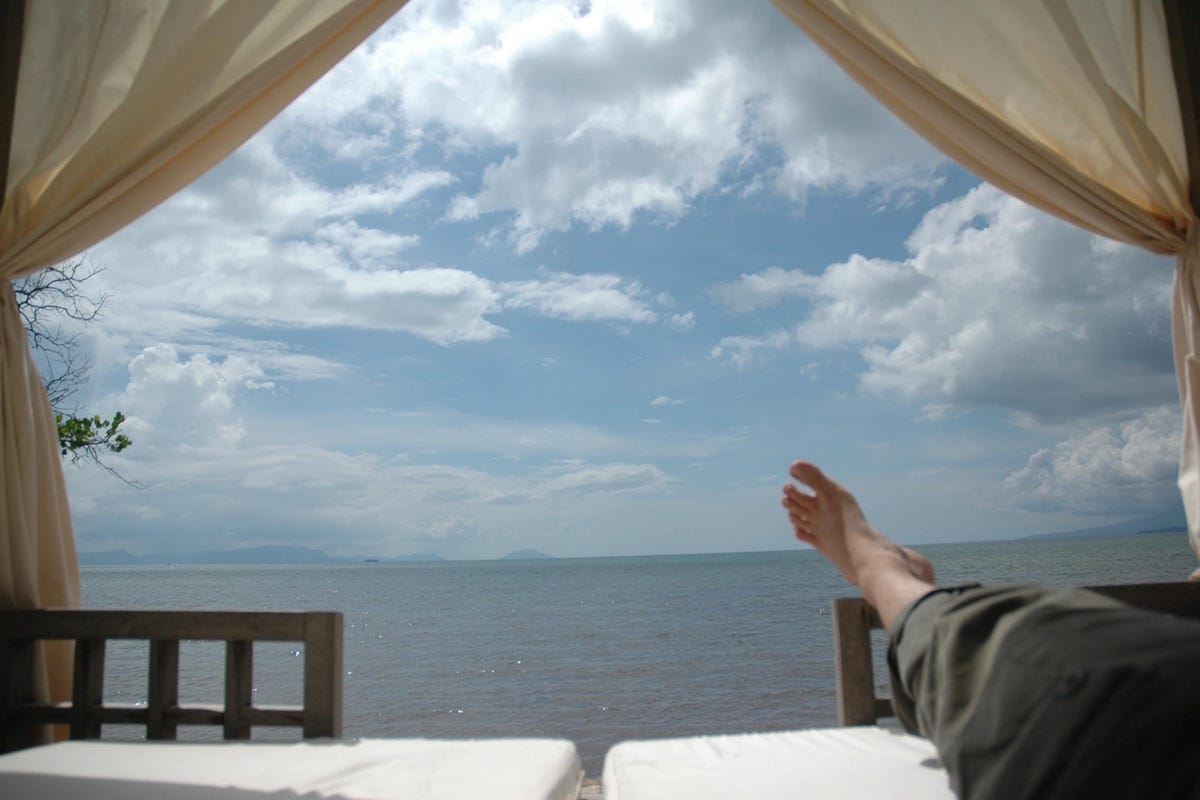The water cooler at immigration offices around the world is a happening place it seems. Every now and then, when there is nothing else to talk about, the topic of “digital nomad visas” pops up. Thailand has had it. Vietnam has had it. Indonesia has had it. Cambodia has had it. As have countries elsewhere on the planet.
It’s an ideal one to shoot the breeze over between deportation reconciliations. It sounds like such a good idea. So simple. The problem is, it isn’t. It isn’t simple, and, to be honest, I’m not sure it is even a good idea.
This morning, the Jakarta Post ran an editorial on the topic, and in a sea of iffy stories on the subject, it takes the cake. It does serve a purpose though—aside from generating clicks—it neatly wraps up many of the problems. By accident.
Pick the Digital Nomad. At Kep National Park. Photo: Nicky Sullivan.
For those not in the know, the base concept behind a “digital nomad visa” (DNV) is to allow digital nomads (DN) to work while travelling. Boiled down, the idea is that by allowing them to work, they’ll stay longer and spend more. This in turn will benefit local economies. This is all true—to a point.
The reason for the perceived need for the DNV is that most visa rules came about when “remote work” wasn’t a thing. If you were going to work in a foreign country, you would get a job in that country. Be it pulling beers, teaching English, or accounting, the visa rules were designed for people working at places of work. Visa rules did not anticipate a situation where people brought their work with them. This mode of work, to a large part, is a post-internet thing.
Was taking this photo work? At an impossible to photograph today location, Kep. Photo: Stuart McDonald.
In general terms, getting a work permit can be quite involved. In a way this didn’t matter, sure, it was a headache, but given you were going to be in country X for a few years, it didn’t matter. Who cares if deciphering ancient tomes from Jupiter requires less intestinal fortitude? Your employer (often though not always) would assist, and, well, it was just a process that had to be done. It could take anything from a couple of weeks to six months ... or more. It was often expensive—thousands and thousands of dollars depending on the country.
If you’re interested in the Digital Nomads phenomena, Counterflows by Lauren Razavi belongs in your email inbox.
The thing is, if one is only planning on being in a country for six months, this isn’t a tempting option. Often it wasn’t even possible, as one generally needs an employer in-country to get a work visa.
This brings us to the DNV and the “problem” it is trying to address. That is, nomads are already working in-country, just on the wrong visa. They might be on a social or tourist visa, a non-immigrant visa, or whatever. With a longer-stay visa, ostensibly for tourism, they work between hill tribe treks and margaritas.
Sort-of nomad buys beer and melons at Kompong Cham, Cambodia. Photo: Stuart McDonald.
But what is work? The executive checking her email by the pool while on a two-week holiday in Vietnam is working. I mean, even taking a work call is work. What about the novelist taking a six-month island break to finish their next best seller? Or the therapist doing video sessions with clients back in her home country? These people are, to varying degrees breaking the rules.
What about if they’re doing a job that a national could? The Jakarta Post highlights this, writing:
“The government also should set safeguard measures to prevent them from entering the local labor market or from doing digital businesses with domestic enterprises.”
Then, it goes on to say, in the same paragraph no less:
“Remote jobs such as marketing consultants, software engineers, program developers, graphic designers, architects and data analysts, are some of the professional services provided by the target tourists for the nomad visa program.”
Now I hate to break it to the brains-trust at the Jakarta Post, but Southeast Asia has a well-developed programming and graphic design labour force. Take a look at any freelance job market and you’ll see hundreds of well-rated Southeast Asian workers.
This is a problem.
A boat load on some nomads and not-nomads. On the vomit-comet, Koh Kong. Photo: Stuart McDonald.
DNs, through simply being in-country, are contributing to the local economy. They may not be paying tax (aside from VAT/GST or whatever), but they are putting money into the economy. If their jobs are offshore, should they pay tax?
In answer to this, some DNV schemes suggest the visa should be tax-free. I get the logic to a point, but if I was a local programmer and saw foreigners coming into my labour pool, tax-free, I’m not sure I’d be thrilled. If a DN’s earnings are 100% offshore in an industry not served in-country, then it is more reasonable. But how are the authorities to check? Should DNs need to supply their entire client list for the last three years? I’m sure that would go down well.
A common rebuttal I see is DNs saying if country X doesn’t offer a DNV then they’ll just go elsewhere. This reeks of the exact colonial/extractive aspects of tourism many are arguing the industry has to rid itself of.
Immigration policies could do with a shave—just in the right places. Phnom Penh street shaver. Photo: Stuart McDonald.
The common alternative view is to make a DNV a bit more pricey in lieu of tax. I don’t know, let’s say US$500 a month. This removes a need to delve into taxation returns but brings us to the next problem.
If a DNV is say $500 a month, some would go for it. I know DNs who earn enough working remotely that paying that would be a no-brainer. That said, I know other DNs who are flat out earning $500 a month. For them, a DNV, almost regardless of the cost, would be a non-starter.
So a DNV would need to come up with a policy of cracking down on DNs using other visa routes. Remember the raids on Chiang Mai cafes looking for people doing WordPress templates versus emailing their Mum? Not ideal. Immigration staff, already under-resourced, would be as excited as the DNs would be.
We’re here to round up the capacity-builders. At Java Cafe, Phnom Penh. Photo: Stuart McDonald.
The whole DNV thing goes hand in hand with discussion around “high-value tourists.” The Jakarta Post of course jumps in on this, stating:
“Since the direct benefits expected from tourists with nomad visas are their spending or consumption of domestic goods and services, the government should ensure through regulations that tourists using nomad visas should stay at star-rated hotels or apartments and not backpacker accommodation.”
Because no software entrepreneur ever stayed in backpacker accommodation. Because people staying in backpacker accommodation don’t consume domestic goods and services. Who knows what goes on in the Jakarta Post editorial brain.
Phnom Penh’s Sundown Social—looking out and down. Photo: Stuart McDonald.
So what is the solution?
First, one needs to determine what the real problem is. On the downside there are a couple of obvious problems. To some extent, DNs are swimming in the local labour pool rather than in the Gulf of Thailand. They are contributing to the local economy although not really to the tax system. On the upside, they stay far longer than a typical tourist would. Regardless of which bucket they fall into, they spend plenty of money—for that bracket.
On the other hand, there are foreigners wanting to stay long-term in the region. They want to start businesses that will create jobs and careers. Long-term companies that will create long-term wealth for local people. The focus should be here.
Nomads did not build this. At Banteay Chhmar, Cambodia. Photo: Stuart McDonald.
Yes, streamlining immigration systems is desirable. Not particularly for DNs though—rather for long-term, serious investment. Long-stay expatriates offer far better bang-for-the-buck than flyby DNs. They spend more, friends and family visit, they travel extensively in-country. They pay tax.
DNs get the noise, but, like the 30-year-old dude sans headphones in a cafe on a zoom call, they’re a distraction. Regional governments need to take a longer-term view.
Couchfish is 100 per cent independent and reader-supported. If you’re not already a subscriber, and you’d like to show your support, become a paying subscriber today for just US$7 per month—you can find out more about Couchfish here—or simply share this story with a friend.
Don’t forget, you can find the free podcasts on Apple, Pocket Casts and Spotify as well as right here on Couchfish.




















Share this post